If you are a homeowner looking forward to adding value to your property and building something that is a visible appealing feature, you must consider decks and patios in your list.
These two are the best options for an in-budget project and give a good ROI as well as serve many functionalities.
Decks are high-end solutions usually built with wooden planks, whereas patios are more budget-friendly and commonly made of stones.
However, both of these hold great value in their respective regimes and offer their owners a great set of features. Let’s have a more in-depth look at their comparison.
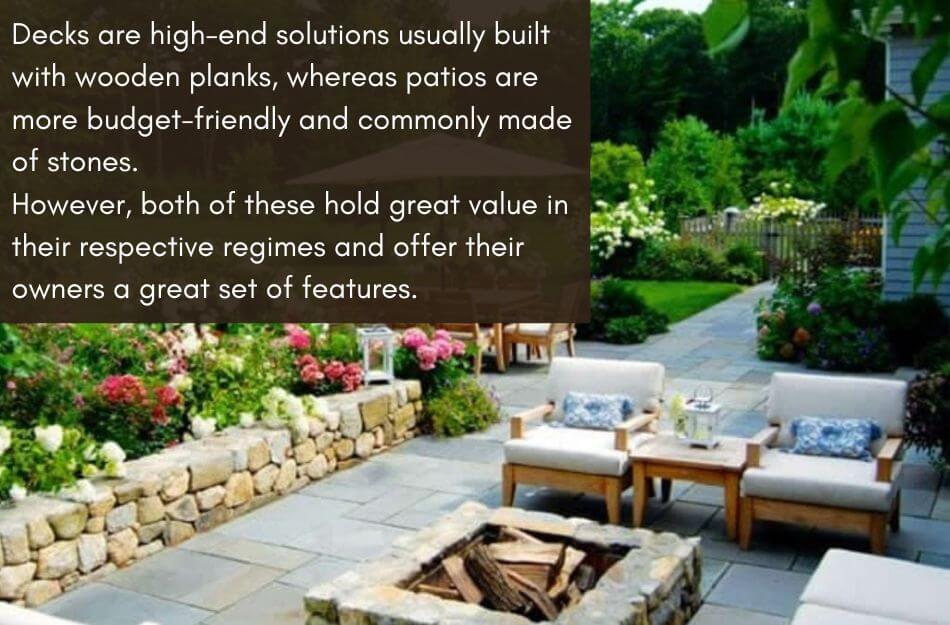
Table of Contents
Difference Between Deck & Patio
Decks are raised wooden platforms built outside the house, which must be adjoined to the house at some point on the first or second story.
In contrast, patios are stone or concrete structures lying on the ground directly and can be built attached or detached from the house.
Both of these can be utilized for outdoor leisure activities like barbecuing, tanning, entertaining, and unwinding and can have features like hot tubs or fire pits and built-in furniture like benches or tables.
However, you need to take care of the platform’s safety on decks made of wood. Conversely, patios can be fine without any such factor as they are far sturdier and more durable.
Besides, being made of stone/ bricks/ concrete allows them a different level of strength.
A paver serves a similar purpose as decks and is usually attached to the house. Unlike decks, common construction materials are concrete, stones, tiles, and bricks.
They are sturdier than decks and can withstand great amounts of pressure.
Also Read: Deck Nail Vs Screw: What’s Best To Use?
Factors To Consider While Deciding Between Decks & Patios
If you are going to decide between decks and pavers, it is extremely important that you take into account various factors, such as the feasibility of construction, overall cost, the strength of the platform, and more.
Only when you have assessed these factors can you decide which of these two will suit your environment and goals best.
If you are worried about researching each factor separately, rest assured, as we have already laid out all the necessary information.
Total Budget
The first and most important factor when deciding which platform is the best for your house is the project’s overall cost.
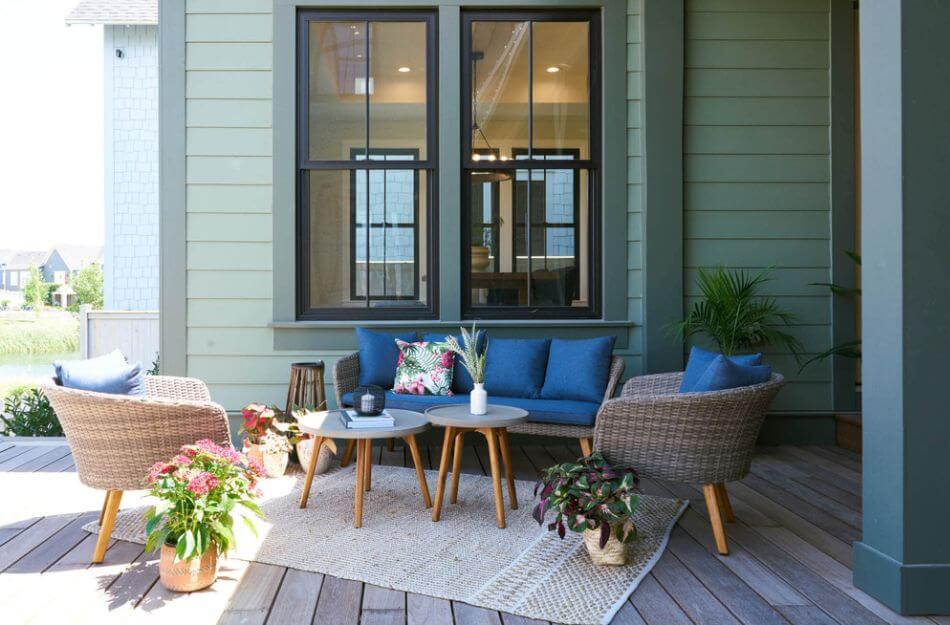
You might have a certain budget in mind and want to move accordingly not to break the bank.
Hence, you must figure out which of these comes into your budget. The average cost of building a deck is almost 8k dollars.
This cost can go as low as 5k dollars and as high as 11k dollars. The per-square-foot cost translates to around 30 to 60 dollars.
Many factors affect this value, and below is an estimated budget for your entire deck-building project according to variable factors:
Type of Wood:
- Natural Softwood (30$ per sq. ft)
- Natural Hardwood ($45 per sq. ft)
- Composite wood ($60 per sq. ft)
Sealing/Staining:
- Sealing ($1000)
- Staining ($800)
- Painting ($600)
Patios are less expensive; depending on what type of stone you’ve used in construction, they can go as high as $20 per sq. ft and as low as $8 per sq. ft.
Moreover, patios do not require staining or sealing, so your average cost of building a patio would be around $3600. So, if you’re on a budget and can’t afford expensive decking, patios are your new friends!
Value To Money
Both decks and patios can increase your property’s value, be it the worth or rental value. Both are expected to provide a return on investment and give you the obvious features.
Although decks are far more expensive than patios, they provide an equally good return on investment. When one spends money on a residential project, one can only have two objectives in mind:
- Increases Value
- Extensive Luxury
Decks and patios provide both of these if done the right way.
Speaking of ROI, if you’ve built a deck worth approximately 10k dollars, you can expect a decent ROI on your property’s overall value if you are willing to sell it or rent it out anywhere.
Decks offer you a 70% ROI, meaning that if you’ve spent roughly 10,000 dollars on your project, it has added at least 7,000 dollars to the worth of your property.
Hence, you instantly recover 70% of your investment in terms of appraisal in net worth and rental value. This means that you have spent only 3,000 dollars.
Patios are far cheaper to build, but they yield a smaller ROI as compared to decks. They can offer as much as 50% returns which are still quite decent compared to similar projects that can’t even add 20% to your property’s value.
A 50% appraisal would mean a $2500 increase in your house’s worth at the expenditure of $5000. Speaking of real estate, this is still a decent ROI for such a small project.
Don’t Miss: Deck Vs Oil Stain: Find Out The Differences
Digging Preferences
If you have no problem with digging, you can easily proceed toward building a deck. This is because all types of decks must be readied from the ground; most of these methods involve digging the ground.
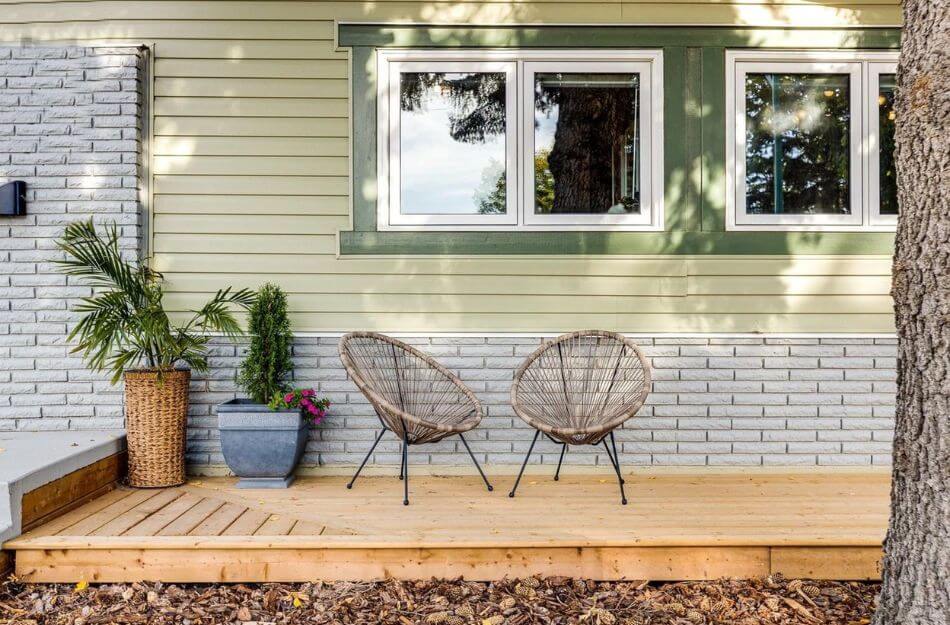
Elevated Decks: These decks are raised at a certain height from the ground to protect the base and provide a sturdy structure. The most common ways to do so are using deck blocks, post anchors, and concrete footings.
Floating Deck: A floating deck is built directly on the ground (only a few inches above) and requires no digging or elevation.
However, it would be best if you kept in mind that the floating deck will not be as protected from the dangers as other types of decks.
As it is built directly onto the ground, it is prone to humidity, weed attacks, other infestations, and much more.
Moreover, the terrain you live on can make a huge difference regarding which option you are going to choose. If the ground in your backyard is uneven, you will have problems with a deck-building project.
Decks are supposed to be elevated from the ground, so getting the ground leveled underneath is crucial to provide a stable platform.
Living on rocky terrain would mean that elevated decks are a big No for you as digging into the rock for your stable platform to be built in would be impossible.
Besides, if you still choose to do so, it will add a significant amount to your overall budget. However, you can still opt for a floating deck, but you won’t be able to achieve a good height with it.
Patios do not require digging and are hence very suitable for people who want to avoid digging or those who live on unfavorable terrains.
You can level the ground for the patio by either digging in or adding another layer of mud:
- Dig the ground to a few inches of depth and level it to make a good platform for your stones or bricks to be placed upon.
- Add wet mud to an existing uneven area and level it from the top. Add stones or bricks on all the edges to make a platform and secure the mud from all sides. This will leave you with a patio of a small height (a few inches)
Hence, working with patios on various terrains is much easier, and you can achieve your goal with much less time and effort.
Maintenance
Maintenance of both platforms is crucial if you want them to maintain their longevity and their pristine condition. While both require maintenance and regular check and balance, decks require much more attention.
- You would need to power wash the deck occasionally to ensure that dirt, grime, and molds do not build up.
- Decks must be sanded down before they can be used so they don’t cause slivers, or the fibers don’t get torn.
- Additionally, decks exposed to snowfall and heavy rain may lose their luster because wood is susceptible to moisture. Hence, it is important to get them sealed to give them a protective coating against the weather.
- Decks need to be cleaned regularly. Otherwise, their health can be compromised. You can’t let water pool on them as it can cause serious damage to the wooden surfaces.
- Inadequate upkeep could result in swelling of wooden planks, splinters, chipping of wood, and even cracking boards which can threaten the overall strength and stability of your deck.
Therefore, you must regularly maintain your deck if you reside in an area with variable weather.
Patios, on the other hand, only require a little attention and can be left on their own for some time without risking their health or pristine condition.
- If your patio is made of concrete or stone, you only need a bit of power washing occasionally to ensure it remains clean and mildew doesn’t build up on it.
- Moreover, regular crack inspections are necessary to prevent any permanent damage to the structure, which can cause further inconveniences in the future.
- You won’t need any staining or sealing on your patios despite the material they are built from.
- However, it is quite hard to repair patios once damaged if they are made of concrete. Hence, maintenance is inexpensive but challenging.
Related: Kreg Deck Jig Vs Camo: Which Decking System is Better?
Durability
Spending such amounts of money on a project can build some expectations regarding the quality and durability of the structure. While both are very strong, patios are certainly more durable than decks.
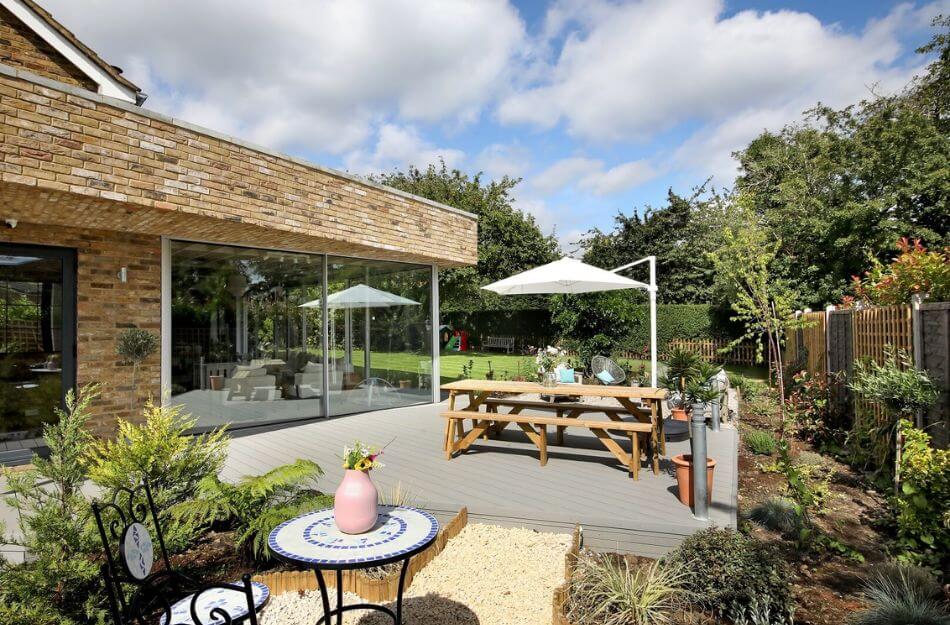
A solid base underneath patios, which is the ground itself, allows them unmatched stability, which increases their capacity to bear weight at all points on the platform.
Being made of concrete or stone gives them a significant edge over wood, as these materials are way too strong compared to all types of wood.
This added benefit of the sturdy material allows them to perform extremely well against harsh weather conditions, moisture, and heat.
While you must worry about the color fading, moisture seeping, and planks cracking in decks, you don’t need to fear any of these with patios.
Besides, concrete and stone are way easier to clean as compared to wooden planks, which have to be cleaned with soft and mild cleaners and polished afterward.
Patios are perhaps a more rugged and more rough & tough option.
But this doesn’t mean that decks are complete trash. They, too, offer an optimal level of protection against the actions of wind, water, and harsh weather conditions and can withstand great amounts of weight.
Especially if you use composite decking, you are at a great advantage. Not only is it strong, but it is also made to be non-porous.
This eliminates any chances of humidity, snow, or rain making it in and causes the boards to swell and lose their original form.
- Composite decking includes both plastic and wood. This mixture allows for added strength and resistance against infestations, moisture, and other weather effects, making it resilient to harshness.
- Composite decking also has a higher lifespan and usually does not need sanding. Sealing or staining is also optional; you can rely on its robustness to combat all the damaging factors.
- Regarding freezing, wind, or climate changes, composite decking is impervious. As a result, it is resistant to warping, splitting, and cracking in harsh weather.
- The best feature composite decking gives you is scratchless ness. You don’t have to worry about ladies walking on it with their heels or kids spurting around and throwing objects. The surface won’t get scratched easily, so you can sit back and relax.
Overall Appearance
It is crucial to decide what kind of look you want on your property and if you have ample space.Decks are usually raised to certain heights, mostly over 4 to 5 feet, attached to the second story, or given a different entrance from the bottom.
However, if you do not have ample space in your backyard, this might look very congested, and despite the fact that you can utilize the available space under the deck very efficiently and even create more room, it is highly possible that the landscape won’t look good if the boundary walls are too close.
However, if you have ample space, you can enjoy the view from the top and install a barbecue grill under the deck’s shadow for small parties and events.
However, if you think there is little space around your house and raising a deck too much can affect the look of your house, you must go for a patio.
A patio can also be used if you have a lot of free space, as it is a remarkable way to add some interesting features and texture to your garden.
Besides, a patio will offer you a greater part for which you can build into many things, and with various skirting styles, you can take the appearance from a simple platform to something extraordinary.
Privacy
If you are someone who focuses too much on their privacy and wants it to be protected, an elevated deck is certainly not your cup of tea.
While a deck provides an amazing view from a height, it comprises your privacy. Moreover, with the type of structure it is, you can’t enclose it at heights as it would look odd.
Especially if you live in a judgemental neighborhood or have neighbors who want to peek in all the time, you can consider a floating deck, but certainly not an elevated one.
Hence, if you’re someone who prioritizes privacy over everything, patios are your go-to option. They are as low as the ground and hence, do not give any chance to anyone to intrude on your privacy.
Pros & Cons of Deck Vs. Pavers
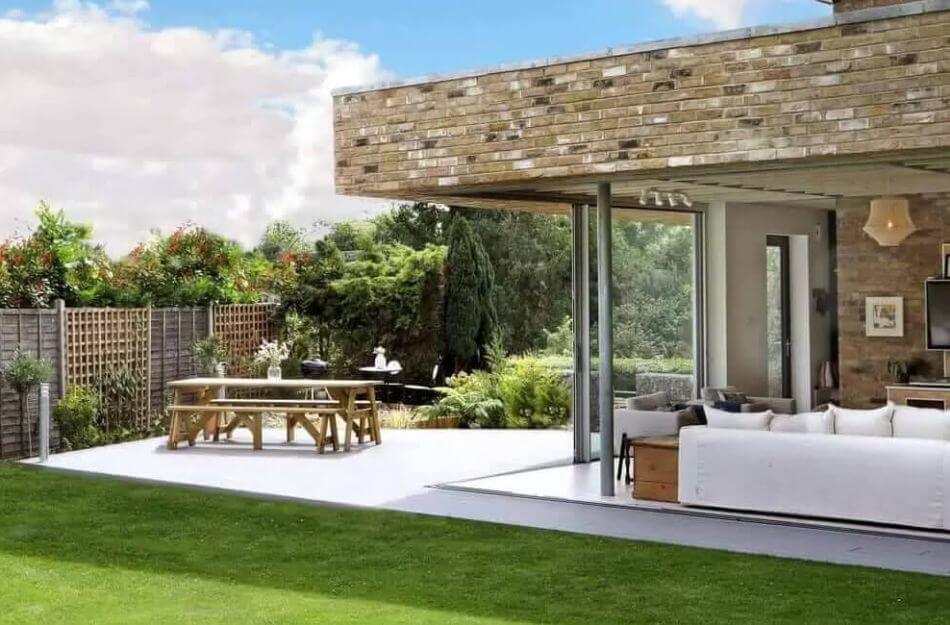
Pros of Deck
- Comfortable in the sun and extreme temperatures
- Greater customizability (stain, paint, etc.)
- The average investment return for the value of your house is 70%.
- Greater square space makes installation simpler and less expensive.
- When constructed on the second level, it offers shade.
- Due to the components used, it is simpler to add to it.
Cons of Deck
- Carry less weight compared to its competitors.
- Because of the materials used,
- Maintenance is more frequent, and their lifetime is shorter.
- In general, extensive permitting is necessary.
Pros of Pavers
- Inexpensive to build
- Easier and cheaper to maintain
- It can be built in various shapes and sizes
- Longer lifespan
- Simple installation
- More options to customize and decorate according to your taste
- More durable against weather conditions
Cons of Pavers
- ROI is not as good as decks
- Can’t be built on second floors
- Harder to maintain as most damages are more or less permanent
Bottom Line
Adding value to your house is a wise decision, and it is even wiser to do so by building a deck or a patio. Both of these options are very productive and practical.
While decks offer greater ROI and a fancier look, adding texture to the terrain, patios make a bolder statement and save a lot of money for you.
Decide what option suits you the most and act wisely. Once you’ve decided, don’t delay, and start your project immediately!
Recent Posts
Although deck sealing may not be at the top of your summer to-do list, you shouldn’t put off a task.One such deck that channels the opposite of the lively and enjoyable vibe you want from an...
Any home would benefit from having a deck because it adds more area for socializing, relaxing, and outside activities.Garden decking that has been properly polished can be elegant and lovely. It...
